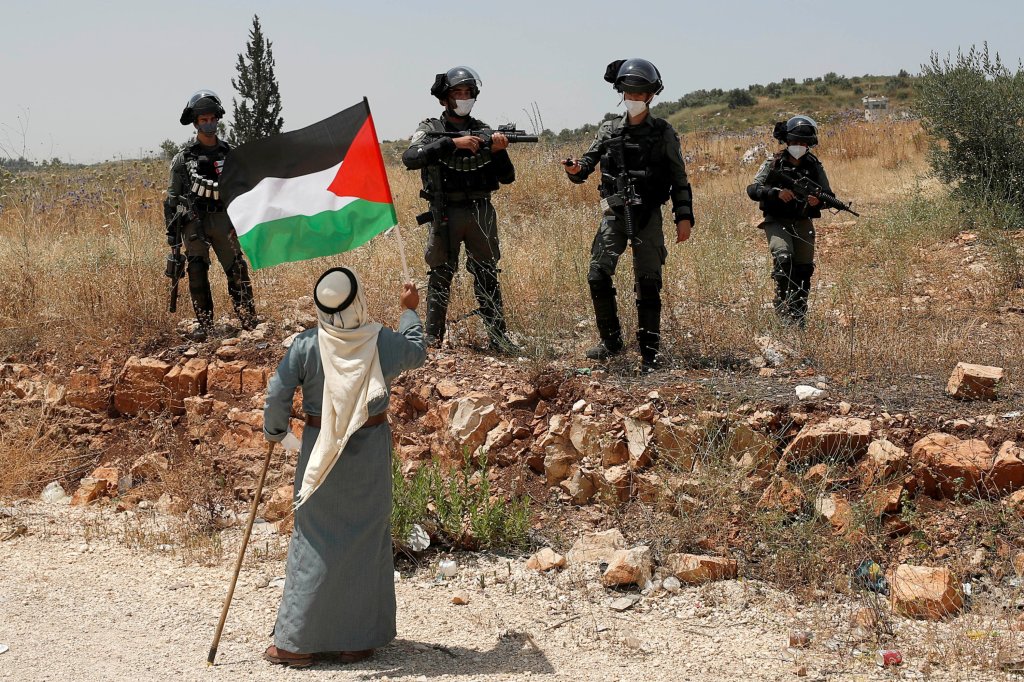Since the 1967 Six-Day War, Israel has occupied various Palestinian territories, including the West Bank, East Jerusalem, and the Gaza Strip. This occupation has involved the establishment of Israeli settlements, the construction of a separation barrier, and the imposition of military control over Palestinian lives and territories.
The Israeli occupation of Palestinian territory since 1967 is a complex and contentious issue. It has its roots in the aftermath of the Six-Day War, when Israel captured and occupied the West Bank, East Jerusalem, and the Gaza Strip. These territories are considered by the international community, including the United Nations, to be occupied Palestinian territory. Israel’s occupation of these territories has been a source of conflict and tension in the region for decades.
The history of Israeli occupation of Palestinian territory since 1967 dates back to the aftermath of the Six-Day War. In this war, Israel captured the West Bank, East Jerusalem, and the Gaza Strip, which had previously been under Jordanian and Egyptian control, respectively. Following the war, Israel began establishing settlements in these territories, claiming them as part of its biblical homeland.
Over the years, the Israeli government has pursued policies and implemented measures to solidify its control over the occupied territories. This has included the construction of settlements, the establishment of military checkpoints and roadblocks, and the imposition of restrictions on Palestinian movement. These actions have profoundly affected the daily lives of Palestinians living in the occupied territories, leading to economic hardship, limited access to resources, and a constant state of insecurity.
International legal perspectives overwhelmingly consider Israel’s occupation of Palestinian territory since 1967 to be illegal. The United Nations and numerous international organizations have repeatedly called for the end of the occupation and the establishment of a viable Palestinian state.
According to international law, the acquisition of territory through war is prohibited. The Fourth Geneva Convention, which governs the protection of civilians during times of armed conflict, explicitly prohibits the transfer of an occupying power’s civilian population into the occupied territory. However, Israel has established Israeli settlements in the West Bank and East Jerusalem, which have been deemed illegal under international law.
The International Court of Justice (ICJ) has also weighed in on the issue. In 2004, the ICJ issued an advisory opinion stating that the construction of the separation barrier by Israel in the occupied Palestinian territory is illegal and should be dismantled. The ICJ further affirmed that Israel’s settlements in the West Bank, including East Jerusalem, are in violation of international law.
The Israeli occupation has resulted in numerous human rights violations against the Palestinian population. Palestinians living in the occupied territories face a range of abuses and restrictions on their basic rights. These violations include extrajudicial killings, arbitrary arrests and detentions, torture, and the use of excessive force by Israeli security forces.
One significant impact of the occupation is the restriction of movement imposed on Palestinians. Israel has established a system of checkpoints, roadblocks, and the separation barrier, which severely limit the freedom of movement of Palestinians within the occupied territories. Palestinians often face long delays and humiliation at these checkpoints, hindering access to healthcare, education, and employment opportunities.
The establishment and expansion of Israeli settlements in the occupied territories also contribute to human rights violations. These settlements are built on confiscated Palestinian land and often involve the demolition of Palestinian homes and the displacement of Palestinian communities. The Israeli government provides settlers with infrastructure, resources, and legal protections, while imposing discriminatory measures and restrictions on Palestinians.
The issue of apartheid has been a subject of debate and comparison in relation to the Israeli occupation. Some argue that the systematic nature of human rights violations against Palestinians, particularly in the West Bank, amounts to apartheid. They point to the creation of separate legal systems and discriminatory policies that favor Israeli settlers over Palestinians.
Critics argue that Israel’s policies, such as the separation barrier, restricted movement, and the allocation of resources, resemble the apartheid system that was enforced in South Africa. They highlight the segregated road networks, separate legal frameworks, and the denial of basic rights and services to Palestinians, which they claim are reminiscent of apartheid-era practices.
Efforts have been made towards peace and resolution in the Israeli-Palestinian conflict, but reaching a lasting and comprehensive resolution has proven challenging. Various initiatives, negotiations, peace agreements, and proposals for a two-state solution have been put forward by the international community and regional actors.
The Oslo Accords, signed in the 1990s, aimed to establish a framework for resolving the conflict and achieving a two-state solution. However, the implementation of the accords faced numerous obstacles, including ongoing settlement construction, violence, and political disagreements.
International organizations such as the United Nations and the European Union have been actively engaged in mediating between the parties and promoting peace efforts. However, the lack of progress in resolving core issues, such as borders, the status of Jerusalem, and the right of return for Palestinian refugees, has hindered the peace process.
The Israeli occupation has faced significant criticism from the international community, human rights organizations, and civil society groups. Some of the main criticisms of the occupation include the violation of international law, the denial of Palestinian self-determination, and the infringement of basic human rights.
Israeli authorities have taken several specific actions in the occupied Palestinian territory to solidify their control and expand Israeli settlements. These actions have had a significant impact on the lives of Palestinians living in the occupied territories.
One example is the rapid and illegal expansion of Israeli settlements in the West Bank, including East Jerusalem. Israeli authorities have provided financial incentives and infrastructure support for settlers, leading to the establishment of numerous settlements on confiscated Palestinian land. This expansion has resulted in the displacement of Palestinian communities and the loss of homes, land, and livelihoods.
Another example is the demolition of Palestinian structures by Israeli authorities. Homes, schools, and other buildings owned by Palestinians have been demolished under the pretext of lacking permits, despite the restrictive and often inaccessible permit application process. These demolitions have led to the displacement of Palestinian families and the destruction of vital infrastructure.
Additionally, Israeli authorities have imposed restrictions on Palestinian access to resources such as water and agricultural land. Palestinians in the West Bank face limited access to water resources due to discriminatory allocation policies, resulting in water scarcity and the reliance on expensive water sources.
The Israeli occupation has had a profound impact on the cultural existence of Palestinians in the occupied territories. Palestinians face various challenges that threaten their cultural heritage, identity, and ability to practice their traditions.
One example is the limited access to holy sites and religious sites. Palestinians, particularly those in the West Bank, face restrictions on their ability to visit and worship at religious sites such as the Al-Aqsa Mosque in Jerusalem. These restrictions limit the ability of Palestinians to practice their faith and participate in religious and cultural activities.
Another example is the impact of the separation barrier on Palestinian communities. The construction of the barrier has resulted in the division of Palestinian communities, separating families, and disrupting social and cultural ties. Palestinians living near the barrier face restrictions on their movement and limited access to essential services, including healthcare and education.
The establishment of Israeli settlements in the occupied territories has also had an impact on the cultural existence of Palestinians. These settlements often encroach upon Palestinian land, leading to the destruction of historical sites and the displacement of Palestinian communities. The presence of settlements disrupts the social fabric of Palestinian society and threatens the preservation of cultural heritage.
Addressing the Israeli occupation and its consequences requires a comprehensive approach that addresses the root causes of the conflict and ensures the protection of human rights for all individuals involved.
One necessary action is the end of the occupation itself. The international community, including the United Nations, has repeatedly called for the end of the Israeli occupation and the establishment of a viable Palestinian state. This would involve the withdrawal of Israeli forces from the occupied territories and the recognition of Palestinian sovereignty and self-determination.
Ending settlement expansion is another crucial step. Israeli settlements in the occupied territories are illegal under international law and contribute to the violation of Palestinian rights. Israel should halt all settlement activities and dismantle existing settlements to create the conditions for a just and lasting peace.
The imposition of discriminatory policies and practices, such as the separation barrier and restrictions on Palestinian movement, should be lifted. Palestinians should have the freedom to move within their own territories and access essential services without hindrance.
Furthermore, accountability for human rights violations must be ensured. The international community should support efforts to investigate and hold accountable those responsible for human rights abuses committed during the occupation. This may include cooperation with international bodies such as the International Criminal Court (ICC) and the establishment of an independent and impartial mechanism to document and prosecute violations.
In conclusion, the Israeli occupation of Palestinian territory since 1967 has had far-reaching consequences for the Palestinian population. The occupation is widely regarded as illegal under international law, with numerous human rights violations and restrictions on Palestinian rights. Efforts towards peace and resolution have faced significant challenges, and the issue of apartheid has been subject to debate and comparison. Addressing the occupation and its consequences requires a comprehensive approach that upholds international law, ensures the protection of human rights, and paves the way for a just and lasting resolution to the Israeli-Palestinian conflict.





Leave a comment